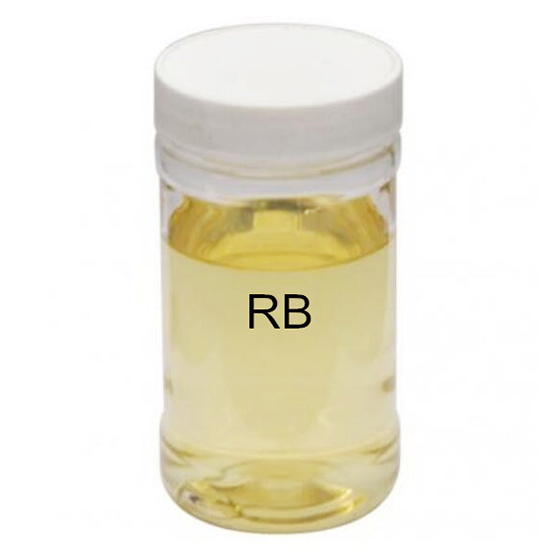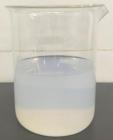
Technical Data
AX C810
SiliconeOil
Introduction
AXC810 is a self-dispersible polyether-amino-functional silicone fluid,which can be generally used on natural and chemical fabrics, such as cotton,polyester,towel or some blended fabrics.Our AXC810 has more wide application on different type of fabrics,and it has special hand-feel and excellent hydrophilicity on fabrics.AXC810has good stability,and leads very little effect on color shade. It can be more hand-feel by combining AX C810. There are ultra-low D4, D5 and D6 contents(<1000ppm), It comply with the Bluesign regulations.Outstanding stable silicone micro emulsion for durable soft handle on all types of cotton and synthetic fabrics.
PROPERTIES
|
Chemical Nature: |
Self-dispersible polyether-amino-functional silicone |
|
Appearance: |
Clear to slightly turbid yellowishfluid |
|
Solid content: |
~80% |
|
Specific gravity at 20° C: |
300-3000cst |
Features of products:
AX C810 can impart spontaneous wettability to even very hydrophobic substrates.
AX C810 provides slippery and smooth hand-feel.
AX C810 has no effect on whiteness. It does not generally affect the color shade or fastness of colored fabrics Ultra-low D4, D5 and D6 contents(<1000ppm)
APPLICATION
Hydro-soft AXsilicone softener can be applied by both padding and exhaustion
Dissolving/diluting
Theemulsionproduct can easily be diluted with cold water.
I. Exhaust process
AX C810(25% emulsion 1~3% o.w.f.). Usage:40°C~50°C×15~30min
II. Padding process
AX C810(25% emulsion 10~30g/L ). Usage: one dip/one nip
Dilution method 1,Cotton,Polyeste, blended fabrics
|
Ingredient |
Dosage/g |
|
AX C810 |
31.25 |
|
Iso-tridecanol polyoxyethlene ether 8EO |
2.08 |
|
Diethylene glycol butyl ether |
2.50 |
|
Acetic acid |
0.75 |
|
Water1 |
44.42 |
|
Water2 |
19.00 |
|
Total solution |
100.00 |
Recommendation emulsifying process:
1.Take AX C810, add solvent such as diethylene glycol butyl ether, add Iso-tridecanol polyoxyethlene ether and acetic acid into the emulsification kettle,then turn on the blender and stir the mixture to homogenous.
2.Then slowly add water1 to emulsification kettle while stirring the mixture as fast as stirrer can. (First part water must be added very slowly)
3.Slowly add water 2 into the emulsification kettle then stirring until the mixture solution is transparent, turn off the blender and filtration the final product.
Dilution method 2, fluffier towel
|
Ingredient |
Dosage/g |
|
AX C810 |
26.51 |
|
Diethylene glycol butyl ether |
1.77 |
|
Hydrophilic soft olein |
3.53 |
|
Iso-tridecanol polyoxyethlene ether 8EO |
0.61 |
|
Acetic acid |
0.64 |
|
Water1 |
43.94 |
|
Water2 |
23.01 |
|
Total solution |
100.00 |
Emulsifying process same as Dilution method 1
**Note: The real dosage should be adjusted according to application process.
III. Storage and shelf-live
When stored in the original unopened packaging at a temperature of between +5°C and +30°C,AX C810 can be used for up to 12 months after the date of manufacture marked on the packaging (DLU).Comply with storage instructions and the expiry date marked on the packaging. This date passed, no longer guarantees that the product meets sales specifications
IV.Performance Comparision
Stability Test
1. Stability Test of dilution method 1 and method 2
Test conditions of Alkali Stability & shear Stability:50°C,pH= 9 (10%,30g/L) working solution,with stirring at 2000r/min for 20min.
|
Sample |
Result |
|
AX C810 emulsion (method 1) |
stability |
|
AX C810emulsion (method 2) |
stability |


Textile test
Preparation conditions of sample :30g/L(10% emulsion),160°C*90s
|
Textile |
AX C810emulsion (method 1) |
Company WA product |
||
|
|
Hydrophilicity/s |
Softness/Slickness |
Hydrophilicity/s |
Softness/Slickness |
|
Cotton Knit |
3 |
2.5 |
3 |
2.5 |
|
Textile |
AX C810emulsion (method 2) |
Company WA product |
||
|
|
Hydrophilicity/s |
Softness/Slickness |
Hydrophilicity/s |
Softness/Slickness |
|
Towel |
<1 |
3 |
<1 |
3 |
Note :1- Worst Softness/Slickness ,5- Best Softness/Slickness
NOTES
Spray application(not product specific)
After many years of analysis of epidemiological studies we suspect that aerosols are generated through the spraying technique that potentially may be hazardous to health.
For this reason spray application can only be safely conducted if sufficient ventilation equipment is installed at the product application site which will prevent spreading of the aerosols into the workplace. A further possibility would be to carry out the spraying application in a closed system.
